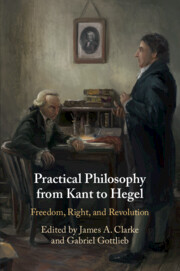Book contents
- Practical Philosophy from Kant to Hegel
- Practical Philosophy from Kant to Hegel
- Copyright page
- Contents
- Contributors
- Acknowledgments
- Abbreviations
- Introduction
- 1 The Original Empty Formalism Objection
- 2 Freedom and Ethical Necessity
- 3 Maimonides and Kant in the Ethical Thought of Salomon Maimon
- 4 Erhard on Right and Morality
- 5 Erhard on Revolutionary Action
- 6 Elise Reimarus on Freedom and Rebellion
- 7 Freedom and Duty
- 8 Fichte’s Ethical Holism
- 9 Jacobi on Revolution and Practical Nihilism
- 10 The Political Implications of Friedrich Schlegel’s Poetic, Republican Discourse
- 11 The Limits of State Action
- 12 Echoes of Revolution
- 13 Public Opinion and Ideology in Hegel’s Philosophy of Right
- Bibliography
- Index
13 - Public Opinion and Ideology in Hegel’s Philosophy of Right
Published online by Cambridge University Press: 16 March 2021
- Practical Philosophy from Kant to Hegel
- Practical Philosophy from Kant to Hegel
- Copyright page
- Contents
- Contributors
- Acknowledgments
- Abbreviations
- Introduction
- 1 The Original Empty Formalism Objection
- 2 Freedom and Ethical Necessity
- 3 Maimonides and Kant in the Ethical Thought of Salomon Maimon
- 4 Erhard on Right and Morality
- 5 Erhard on Revolutionary Action
- 6 Elise Reimarus on Freedom and Rebellion
- 7 Freedom and Duty
- 8 Fichte’s Ethical Holism
- 9 Jacobi on Revolution and Practical Nihilism
- 10 The Political Implications of Friedrich Schlegel’s Poetic, Republican Discourse
- 11 The Limits of State Action
- 12 Echoes of Revolution
- 13 Public Opinion and Ideology in Hegel’s Philosophy of Right
- Bibliography
- Index
Summary
This chapter explores the problem of public opinion in Hegel’s Philosophy of Right. I argue that for Hegel, the problem of public opinion is closely related to the problem of ideology critique, representing a departure from the Kantian approach to publicity as a path to enlightenment, and the development of a nascent critical theory. First, I provide an overview of Hegel’s understanding of public opinion by taking up its positive and negative aspects. Hegel’s departure from Kantian themes is clearly discerned in his understanding of the formation and function of public opinion, which traces its origins to the estates, leading to a conflict between private interests based on social status and the public good. With Hegel’s understanding in view, I then assess the extent to which this represents the development of a concept of ideology by drawing on Raymond Geuss’ definition. I show that public opinion has certain epistemic, functional, and genetic features that are connected with ideology, and further, that Hegel’s account of social practices helpfully contributes to contemporary debates. Finally, I turn to the Natural Law essay and argue that Hegel’s objections against empiricism and formalism in political theorizing share important affinities with critical theory.
- Type
- Chapter
- Information
- Practical Philosophy from Kant to HegelFreedom, Right, and Revolution, pp. 229 - 248Publisher: Cambridge University PressPrint publication year: 2021
- 2
- Cited by

